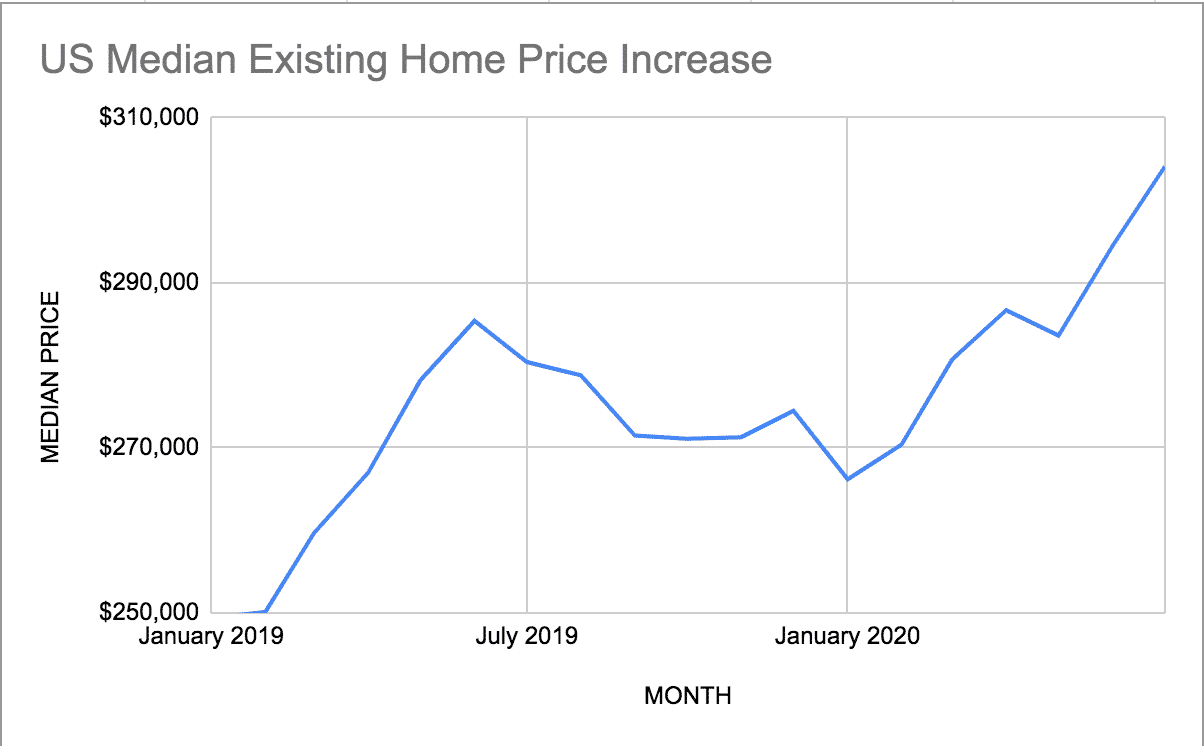Covid-19 and the related economic shutdown threatened to significantly impact the real estate industry, as with most other sectors of the nation’s economy. Intially, the stay-at-home orders effectively froze real estate sales in most areas of the country for approximately four to six weeks, during the heart of spring, typically real estate’s busiest time of year. At the time, economists estimated that 2020 existing home sales would fall at least 10 percent from 2019’s total of 5.34 million to 4.5 – 4.8 million homes.

But then June numbers represented a pickup, followed by an explosion in July, and now NAR Chief Economist Lawrence Yun estimates that 2020’s existing home sales will end up approximately 2 to 3 percent above 2019’s count.
| Year | Month | Actual Home Sales (Not Seasonally Adjusted) | YOY % Change (Sales) |
| 2020 | January | 317,000 | 11.23% |
| 2020 | February | 335,000 | 7.72% |
| 2020 | March | 416,000 | 4.00% |
| 2020 | April | 373,000 | -18.20% |
| 2020 | May | 372,000 | -31.37% |
| 2020 | June | 507,000 | -3.98% |
| 2020 | July (prelim) | 597,000 | 10.56% |
Source: National Association of Realtors
The significant real estate activity that typically marks the second quarter essentially shifted to the third quarter, with activity spurred by extremely low inventory, record low mortgage rates and increased demand as homebuyers began to evaluate homes differently. Consequently, median home prices jumped to their highest level ever in July, $304,100, the first time the price has crossed the $300,000 mark.

Even though real estate activity has snapped back, the pandemic has spurred some changes in the industry. In this article, T3 Sixty outlines a few of the changes. The 220-page 2021 Swanepoel Trends Report, currently in production and scheduled for a December 7 release, will cover this topic in significantly more detail.
Some Pandemic-Spurred Real Estate Changes Likely to Stick
Virtual Buying
Virtual showings and virtual transactions have increased compared to pre-pandemic levels. While technology has supported virtual closings or near-virtual closings, and a noticeable number of site-unseen home sales during the pandemic, early research indicate that many consumers would still like to see the home they before buying before writing an offer. Many would also like to physically attend the closing when it’s time to complete the transaction; others, however, are happy to close virtually.
More Streamlined Processes
Brokerage back-office tasks have gotten much more efficient during Covid-19. Many already had systems in place to handle accounting and agent payments digitally, for example, but had not refined or implemented the processes to a high degree.
In addition, some of their agents were reluctant to transition to digital payments and sometimes transaction management. With the pandemic forcing a touchless system on all accounts, brokers, their staff, and agents implemented these systems, processes and technologies, and got comfortable with them by necessity. The ability to sign and complete a transaction from a smartphone, once done, becomes too convenient to turn back from.
Better, Wider Communication
While brokers and agents used video communication before Covid-19 arrived, the pandemic, of course, amplified the use of video meeting services such as Zoom, Microsoft Teams and Google Meet. Brokerages have begun leveraging this technology significantly more extensively, especially to communicate with their staff and agents and well as have the agents communicate with clients.
Agents attend virtual weekly sales meetings much more, than driving to the office. After the pandemic passes, more agents will access these meetings and attend new ones, and brokers may pour more resources into developing them as demand and attendance rise.
More Production at the Top
As the industry continues to evolve and consolidate – along with a steady maturation of technology and processes – the pandemic, as in many challenging times, shifts more business and opportunities to dedicated brokers agents with the aptitude and interest to leverage tech, systems and diligence to outcompete other brokers and agents.
Takeaway Covid-19 has deeply impacted every element of American society, and the residential real estate brokerage industry is no exception. The full effect on the industry, of course, remains unknown, but the pandemic has accelerated some of the adoption of processes and tech that support a more virtual, cloud-based industry. Stay tuned for our full analysis in the 2021 Swanepoel Trends Report.
